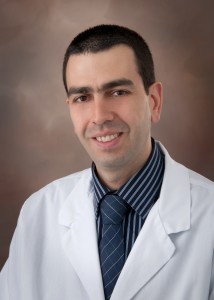Hospitals are under increasing pressure to improve clinical quality and adhere to an array of ever-changing measurement and reporting requirements. Many organizations are turning to hospitalists to steer those efforts. Dr. Vercin Ephrem (VE), chief of hospital medicine at LRGHealthcare, in Laconia, NH, spoke with Maureen McKinney (MM), a healthcare journalist and editorial programs manager at Modern Healthcare magazine, about the guiding role hospitalists can play in quality and safety programs. Here is a lightly edited transcript of their discussion.
MM: Why do you think hospitalists are well-suited to lead quality-improvement initiatives?
VE: Hospitalists are embedded in patient care through the entire care continuum. We work with all departments necessary to ensure that best care practices are met. One of the greatest benefits is that we’re working with the same set of people day in and day out, so we know who to contact in pharmacy, embedded care, nursing, etc. to get what we need for our patients. Being there on the floor each day means we get to see, experience, and lead the entire care process, providing us with firsthand knowledge of what we’re doing right and what we may need to improve upon.
MM: What specific challenges do smaller hospitals like yours face when it comes to improving quality and safety?
VE: As a small hospital, we are challenged by several barriers, including less financial support, less staffing support and fewer resources. That’s why we find it very important to work some of the resources we have within our community. That has been a great strategy for us in reaching our goals for quality.
MM: How does the hospitalist role differ in smaller hospitals? Do you think more small hospitals are using hospitalists?
VE: In a small hospital, hospitalists don’t have all the specialists to work with that they might in a larger hospital, so it’s imperative that we have a broader knowledge of all specialties. Without the back up of various specialists, we essentially need to be an expert in all.
I do think smaller hospitals are using hospitalists because PCPs are needed in their practices. It’s becoming more important for smaller hospitals to turn to hospitalists for inpatient care in order to sustain patient services.
MM: Could you give an example of a quality and safety project that you’ve led at LRGHealthcare and explain how you drew on your skills as a hospitalist?
VE: Because we’re a small organization, I’m known by my name, not just as an employee. So, I’ve had the luxury of being more in tune to the strategic vision of our hospitals. This allowed me to lead the organization into some great initiatives for quality and safety.
We’ve worked very hard on our initiatives in transitioning patients. Our care process begins from getting the patients from the ER to the bed, from the bed to discharge, and even from discharge to the home or nursing home. Through work with the ER, skilled nursing facilities, and daily patient rounding, as well as programs like BOOST (Better Outcomes by Optimizing Safe Transitions), we’re now with the patient from the ER to the home or nursing home for the full continuum of care. Our care is not over when they leave our hospital; we follow up with them to ensure their care needs are being met and will therefore, hopefully, avoid readmissions.
To learn more about how to incorporate and lean on hospitalists to lead quality improvement efforts, join Dr. Ephrem on Modern Healthcare’s upcoming webinar, “How Hospitalists Can Lead on Quality,” on Tuesday, Jan. 27, at 10:00 a.m. CT. The panel also includes Dr. Bob Wachter, chief of the division of hospital medicine at UCSF Medical Center, and Dr. Kevin O’Leary, chief of the division of hospital medicine at Northwestern University Feinberg School of Medicine.
Registration is free. http://www.modernhealthcare.com/article/20141219/INFO/312199999
 Vercin Ephrem, MD, is a Board Certified Internal Medicine physician; the Chief of Service of Hospital Medicine and President of the Medical Staff at LRGHealthcare in New Hampshire. Dr. Ephrem is the Medical Director of Mountain Ridge and St. Francis Nursing Homes.
Vercin Ephrem, MD, is a Board Certified Internal Medicine physician; the Chief of Service of Hospital Medicine and President of the Medical Staff at LRGHealthcare in New Hampshire. Dr. Ephrem is the Medical Director of Mountain Ridge and St. Francis Nursing Homes.
He serves on several committees for LRGHealthcare: Quality Improvement, Infection Control and Epidemiology, Medical Executive, Project BOOST, and Physician Advisory Group for Electronic Health Record Implementation.
 Maureen McKinney is the editorial programs manager for Modern Healthcare, overseeing virtual conferences, webinars and a range of other healthcare leadership events. She also reports on evidence-based best practices and other feature topics. McKinney has more than a decade of experience reporting on healthcare, including her most recent post as Modern Healthcare’s quality and patient safety reporter. Prior to joining Modern Healthcare in 2010, she reported on health information technology and healthcare business for a number of top industry publications. She has a bachelor’s degree in communications from the University of Michigan and a master’s degree in journalism from Northwestern University.
Maureen McKinney is the editorial programs manager for Modern Healthcare, overseeing virtual conferences, webinars and a range of other healthcare leadership events. She also reports on evidence-based best practices and other feature topics. McKinney has more than a decade of experience reporting on healthcare, including her most recent post as Modern Healthcare’s quality and patient safety reporter. Prior to joining Modern Healthcare in 2010, she reported on health information technology and healthcare business for a number of top industry publications. She has a bachelor’s degree in communications from the University of Michigan and a master’s degree in journalism from Northwestern University.


Leave A Comment